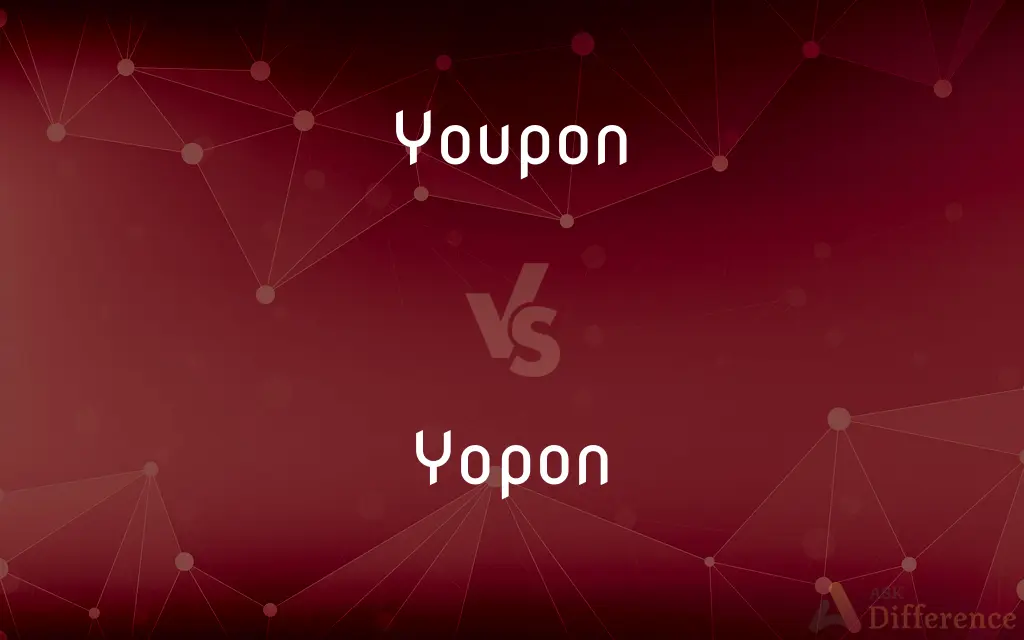Youpon vs. Yopon — What's the Difference?
By Urooj Arif & Fiza Rafique — Updated on March 24, 2024
Youpon and Yopon are both variants of the name for a holly plant, with regional preferences influencing the spelling.

Difference Between Youpon and Yopon
Table of Contents
ADVERTISEMENT
Key Differences
Youpon is a variant of the name for a holly species known for its small, glossy leaves and red berries, often used in landscaping for its ornamental value. Whereas, Yopon is another spelling variation, possibly reflecting regional dialects or phonetic interpretations of the plant's name.
This holly is appreciated not just for its aesthetic appeal but also for its tolerance to various environmental conditions, making it a versatile choice for gardeners and landscapers. On the other hand, the spelling difference might hint at geographical influences on common names, where 'Youpon' might be more prevalent in one area, and 'Yopon' in another, despite referring to the same plant.
The plant is also known for its use in making a caffeinated tea from its leaves, a traditional practice among some Native American tribes. However, it's important to note that the primary interest in this plant is usually its decorative aspect rather than its culinary uses.
The berries of the plant, while attractive, are toxic to humans and should be handled with care, especially in households with children or pets.
Comparison Chart
Spelling
Youpon
Yopon
ADVERTISEMENT
Regional Preference
Might be preferred in certain regions
Might be preferred in other regions
Usage
Ornamental, landscaping
Ornamental, landscaping
Cultural Significance
Used for tea in some Native American tribes
Used for tea in some Native American tribes
Toxicity
Berries are toxic
Berries are toxic
Compare with Definitions
Youpon
A type of holly with small, glossy leaves and red berries.
The youpon holly added a vibrant touch to the winter landscape.
Yopon
A variant spelling of a holly species, used in certain regions.
The garden featured several yopon shrubs near the entrance.
Youpon
A versatile plant known for its environmental tolerance.
Despite the harsh soil, the youpon thrived impressively.
Yopon
An ornamental holly with attractive foliage and berries.
The red berries of the yopon added a splash of color in winter.
Youpon
An evergreen shrub native to the southeastern United States.
We planted youpon along the walkway for year-round greenery.
Yopon
A landscaping choice for its low maintenance and beauty.
For a low-maintenance garden, consider adding yopon.
Youpon
A plant used traditionally for its caffeinated leaves in teas.
They brewed tea from youpon leaves as a morning ritual.
Yopon
A plant sometimes utilized for its leaves in traditional teas.
Yopon tea has a unique flavor and a hint of caffeine.
Youpon
An ornamental plant appreciated for its aesthetic appeal.
The landscaper recommended youpon for the garden renovation.
Yopon
Known for its adaptability to various environmental conditions.
Yopon proved to be the most resilient plant in the coastal garden.
Youpon
Archaic form of yaupon
Yopon
Alternative form of yaupon
Youpon
Same as Yaupon.
Common Curiosities
What are Youpon and Yopon?
Youpon and Yopon refer to the same holly plant, known for its ornamental value, with variations in spelling possibly reflecting regional preferences.
Are Youpon and Yopon good for landscaping?
Yes, both are popular in landscaping for their aesthetic appeal and environmental tolerance.
How should I care for a Youpon/Yopon plant?
These plants are relatively low-maintenance but prefer well-drained soil and partial to full sun exposure.
Can Youpon and Yopon thrive in cold climates?
They are hardy to a point but prefer the warmer climates of the southeastern United States.
Can Youpon/Yopon berries be eaten?
No, the berries of the Youpon/Yopon plant are toxic to humans and should not be consumed.
Is there a difference between Youpon and Yopon tea?
No, the tea made from the leaves of these plants is the same, regardless of the spelling variation used.
How tall can a Youpon/Yopon plant grow?
These plants can grow up to 15-20 feet tall under optimal conditions, though they can be kept shorter through pruning.
Can Youpon/Yopon plants be used for privacy hedges?
Absolutely, their dense foliage makes them excellent for privacy hedges.
How fast do Youpon and Yopon grow?
They have a moderate growth rate, contributing to their popularity in landscaping.
Are Youpon and Yopon deer resistant?
Yes, these plants are generally considered deer resistant, making them suitable for areas with deer populations.
Is Youpon/Yopon suitable for indoor planting?
Generally, they are best suited for outdoor gardens due to their size and need for sunlight.
Do Youpon and Yopon attract wildlife?
Yes, the berries can attract birds, but the plants are toxic to most mammals.
What are the main uses of Youpon and Yopon?
Primarily ornamental, but also historically for caffeinated tea by some Native American tribes.
Where is the best place to plant Youpon/Yopon in the garden?
They thrive in areas with full to partial sun and well-drained soil, making them versatile for various garden locations.
How are Youpon and Yopon different from other hollies?
They are noted for their small leaves, red berries, and the ability to thrive in a variety of conditions.
Share Your Discovery

Previous Comparison
Stores vs. Store
Next Comparison
Endogenous vs. IndigenousAuthor Spotlight
Written by
Urooj ArifUrooj is a skilled content writer at Ask Difference, known for her exceptional ability to simplify complex topics into engaging and informative content. With a passion for research and a flair for clear, concise writing, she consistently delivers articles that resonate with our diverse audience.
Co-written by
Fiza RafiqueFiza Rafique is a skilled content writer at AskDifference.com, where she meticulously refines and enhances written pieces. Drawing from her vast editorial expertise, Fiza ensures clarity, accuracy, and precision in every article. Passionate about language, she continually seeks to elevate the quality of content for readers worldwide.












































